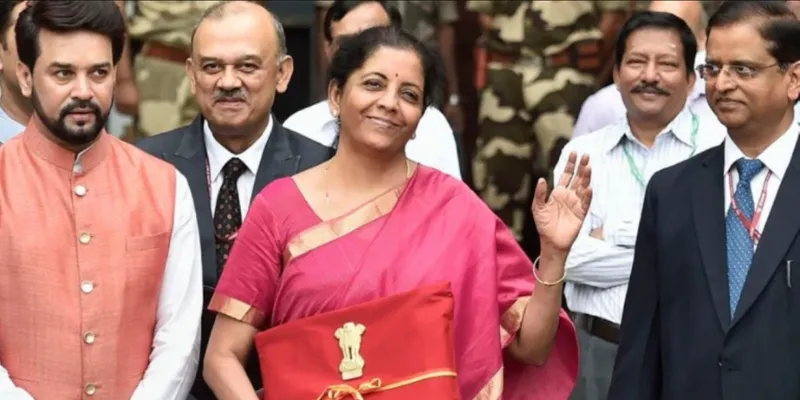Budget 2019: US corporate sector welcomes forward-looking approach, says will attract FDIs
Corporates laud Nirmala Sitharaman’s Budget, saying it will open up the Indian market, encourage US companies to invest more, and make Prime Minister Narendra Modi's larger vision for a modern India a reality.
The American corporate sector has hailed Finance Minister Nirmala Sitharaman’s maiden Budget, noting that it is not only inclusive but also attractive for foreign investments.
Mukesh Aghi, President of US India Strategic and Partnership Forum (USISPF), said the Budget was inclusive and policy decisions were encouraging for American companies.

Finance Minister Nirmala Sitharaman's Budget is being hailed as 'good news'.
It's “good news” for companies like Apple, Aghi said, adding that the Budget opened up the Indian market, and would encourage US companies to invest more even as it ensured prosperity and growth for the lower sections.
Nisha Desai Biswal, President of US India Business Council (USIBC), said: “We are pleased to see a 2019-20 Budget that delivers a forward-looking and reform-minded approach for the Modi government's second term."
USIBC welcomed the proactive measures to double farmers' income, liberalise FDI in a number of sectors, allow 100 percent FDI for insurance intermediaries, and increase FPI investment limits - all reforms USIBC has actively supported, she said.
'A visionary Budget'
USIBC members will be encouraged by the Budget's focus on skilling Indians, with an emphasis on jobs in data analytics, artificial intelligence, and robotics, Biswal added.
"Goals like transforming India into a global space and aviation hub also demonstrate the longer-term thinking of the new government. We look forward to working with Prime Minister Narendra Modi and the government of India to make these priorities, and the larger vision for a modern India a reality," Biswal said.
"This is a visionary budget from the first woman Finance Minister of India marked with a long-term, 10-year plan while retaining focus on immediate priorities," said Karun Rishi, President of USA-India Chamber of Commerce.
The focused impetus for sustainable job creation via targeted investment in infrastructure will have a ripple effect on secondary and tertiary employment.The mission to provide housing to all by 2022 has the potential not just for growth in downstream sectors such as cement and steel but also for overall job creation in these vital industries, he said.
Rick Rossow, from the Centre for Strategic and International Studies (CSIS) think-tank, noted that it was is a relatively cautious Budget, considering the government's election mandate.
“I expected some bigger ideas, but instead we saw a continuation of key programmes such as infrastructure development, expansion of social programmes in rural areas, and nods to big campaigns like Digital India and Make in India," Rossow said.
A 'reasonable' balance
From a foreign business perspective, it was a mixed bag, he said. “On the positive side, several sectors were listed for foreign investment reforms, including insurance, media, and single brand retail,” he added.
“Customs duties are to be reduced in some narrow areas like specialty chemicals and capital goods for electronics manufacturing. But in a range of other sectors, customs duties will be increased, including auto parts, video recorders, metal fittings, and more. This Budget is not going to alleviate the current state of trade tensions between the US and India,” Rossow said.
Lauding the fiscal deficit target of 3.3 per cent for FY 2020, Rishi said much would depend on the execution and global economic factors.
The Budget strikes a reasonable balance between addressing the objective of inclusivity and laying the path for Prime Minister Narendra Modi's vision of a $5 trillion economy by focusing on infrastructure spending, incentivising affordable housing, and providing growth capital for PSU banks, he said.
Global research and innovation hub
Setting up the National Research Foundation (NRF) chaired by Prime Minister Narendra Modi and co-chaired by Principal Scientific Advisor K Vijay Raghavan to fund, coordinate, and promote research in India will be a game-changer, Rishi said.
“The NRF's focus on promoting and funding multi-disciplinary, multi-institutional, multi-investigator-led research by having robust industry-academia collaboration could tremendously benefit the biopharma and healthcare industry in India. Indian and global patients can look forward to cutting-edge, innovative medicines coming out of India in the next five to 10 years," he said.
Stating that USA-India Chamber of Commerce has been encouraging structured research in India for over 12 years, Rishi said the current setup was not efficient. The NRF could correct the deficit in research, he asserted.
As per data released by the central government, India's research and innovation investment vis-a-vis global standards in terms of percentage of GDP is quite less (0.68 per cent) in comparison to the United States (2.8 per cent), China (2.1 per cent), Israel (4.3 per cent), and South Korea (4.2 per cent).
If India aims to emerge as a global research and innovation hub, apart from just increasing the funding, we need to have a central systematic mechanism to fund and monitor research and innovation outcomes, especially in the fields of national importance.
“Under the guidance of top leadership, the NRF has the potential to make India a global partner in biopharma research and development. A 15.4 percent increase in allocation to the healthcare sector compared to the previous year's revised Budget is a remarkable step,” Rishi said.











